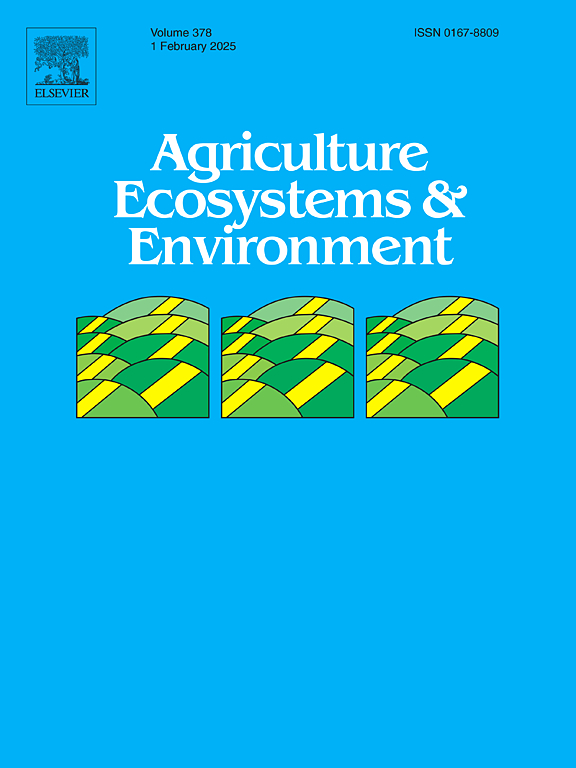Context dependency and differential arthropod responses belie simple agro-ecological management solutions
IF 6.4
1区 农林科学
Q1 AGRICULTURE, MULTIDISCIPLINARY
引用次数: 0
Abstract
Policies promoting agroecological management aim to counteract the adverse effects of agricultural intensification on biodiversity, and ecosystem health with varying effectiveness. This study evaluates the effects of agroecological management practices and environmental heterogeneity on biodiversity, pest control services, and crop yields in winter wheat, barley, and oilseed rape fields in Switzerland. We assessed plant species diversity, pest and predator populations, and crop yield across 44 agricultural fields managed with either conventional or agroecological practices, including the establishment of wildflower strips (WFS) and reduced pesticide use. Vegetation diversity was higher in agroecological fields compared to conventional fields, but this did not lead to an increase in predator populations. While ground-dwelling beetles are potentially enriched, neither spiders or parasitoids, nor pest abundances were higher in agroecological fields. Pest pressure was not affected by predator abundance, while yields were significantly higher in conventional fields, with the differences attributed to farming practices rather than the influence of vegetation diversity or pest presence. The effect of environmental heterogeneity varies across taxa and depends on the landscape feature considered.
Synthesis and applications
Our findings indicate that while agroecological practices can enhance vegetation diversity and support a diverse arthropod community, these benefits do not necessarily lead to improved pest control or increased yields. The variability in responses suggests that the effectiveness of such measures is highly context dependent. Therefore, tailored strategies that consider specific crop and landscape characteristics are needed to optimize pest management and maintain productivity in sustainable farming systems.
环境依赖性和节肢动物的差异反应使得简单的农业生态管理解决方案难以实现
促进农业生态管理的政策旨在以不同的效果抵消农业集约化对生物多样性和生态系统健康的不利影响。本研究评估了农业生态管理措施和环境异质性对瑞士冬小麦、大麦和油菜田生物多样性、病虫害防治服务和作物产量的影响。我们评估了44块农田的植物物种多样性、害虫和捕食者种群以及作物产量,这些农田采用传统或农业生态管理方法,包括建立野花带(WFS)和减少农药使用。生态农业田的植被多样性高于常规农田,但这并未导致捕食者种群的增加。在农业生态领域,虽然地面生活的甲虫可能丰富,但蜘蛛或拟寄生虫和害虫的丰度都不高。害虫压力不受捕食者丰度的影响,而常规农田的产量明显更高,其差异归因于耕作方式,而不是植被多样性或害虫存在的影响。环境异质性的影响在不同的分类群中有所不同,并取决于所考虑的景观特征。研究结果表明,虽然农业生态措施可以增强植被多样性并支持节肢动物群落的多样性,但这些好处并不一定能改善害虫防治或提高产量。反应的可变性表明,这些措施的有效性高度依赖于具体情况。因此,需要考虑到特定作物和景观特征的量身定制战略,以优化病虫害管理并保持可持续农业系统的生产力。
本文章由计算机程序翻译,如有差异,请以英文原文为准。
求助全文
约1分钟内获得全文
求助全文
来源期刊

Agriculture, Ecosystems & Environment
环境科学-环境科学
CiteScore
11.70
自引率
9.10%
发文量
392
审稿时长
26 days
期刊介绍:
Agriculture, Ecosystems and Environment publishes scientific articles dealing with the interface between agroecosystems and the natural environment, specifically how agriculture influences the environment and how changes in that environment impact agroecosystems. Preference is given to papers from experimental and observational research at the field, system or landscape level, from studies that enhance our understanding of processes using data-based biophysical modelling, and papers that bridge scientific disciplines and integrate knowledge. All papers should be placed in an international or wide comparative context.
 求助内容:
求助内容: 应助结果提醒方式:
应助结果提醒方式:


